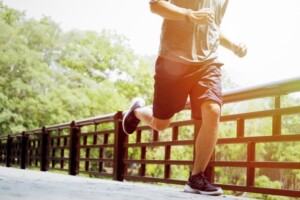
What’s going on when your pulse is 110 at rest but you don’t smoke or eat caffeine?
A heart rate at rest of 110 is outside the normal range.
“The pulse at rest should usually be between 60 and 100 bpm,” says Daniel P. Morin, MD, FACC, formerly Director of both Electrophysiology Research and Cardiovascular Research for Ochsner Health System, and currently Professor of Medicine and Cardiology at University of California, San Francisco.
“Faster than that may still be normal for some patients, or it may indicate something abnormal,” continues Dr. Morin. at rest
“Caffeine may indeed increase the resting heart rate on the short term, but not likely to >110 bpm.
“People certainly should not smoke cigarettes for a variety of reasons, but for chronic smokers, cigarette intake should have only a limited effect on the resting pulse.”
If you’re constantly taking your pulse throughout the day – literally, from morning to night, wherever you are – you are taking it something like 10 times an hour – this nerve-racking pursuit alone could keep your resting heart rate near 110 for most or many of the readings.
Perhaps one day you discovered it was 110 for no reason.
This then set you off on a journey of compulsive pulse taking.
On the other hand, maybe you don’t take your pulse that much throughout the day, but nearly every time you do take it, it hovers around 110.
It’s possible that during the times you don’t take it, there are some slower heart rates in there.
Nevertheless, it’s reasonable to be concerned that your pulse seems to always be about 110 at rest.
If you suffer from frequent anxiety and stress, this can cause a persistently elevated heart rate.
With anxiety, the body “thinks” there’s an imminent threat and hence, keeps the heart rate elevated to prepare for a fight or flight.
An elevated heart rate would really help out in a fight or flee, as the body would require more blood to carry out the physical exertion.
But a persistent state of fight or flight is bad for the body and can cause all sorts of ailments like diarrhea, headaches, hair loss and…of course…a rapid pulse.
110 Per Minute Heart Rate in Fit People vs. Out of Shape
“In general, people who are more physically fit would tend to have a lower resting heart rate,” says Dr. Morin.

Freepik.com/ ijeab
“Professional endurance athletes, for example, can have resting heart rates in the 40s or even lower!”
This doesn’t mean, though, that a highly trained endurance athlete can’t sometimes have a high heart rate at rest – due to persistent anxiety.
Dr. Morin continues, “Those who are less fit – including but not limited to those who are heavier – may tend to have a higher resting heart rate.
“A resting heart rate that is persistently >100 bpm may indicate a problem, however, and could be investigated more thoroughly via the use of electrocardiograms (ECGs) and/or other testing, including Holter monitoring and/or imaging of the heart via echocardiography.”
A Holter monitor is a portable device strapped to your midsection that you wear for 24 hours. It records data on your heartbeat.
 Dr. Morin’s clinical interests are in device therapy for cardiac dysfunction (including cardiac resynchronization therapy) and treatment of cardiac arrhythmias with medical therapy and/or catheter ablation.
Dr. Morin’s clinical interests are in device therapy for cardiac dysfunction (including cardiac resynchronization therapy) and treatment of cardiac arrhythmias with medical therapy and/or catheter ablation.
 Lorra Garrick has been covering medical, fitness and cybersecurity topics for many years, having written thousands of articles for print magazines and websites, including as a ghostwriter. She’s also a former ACE-certified personal trainer.
Lorra Garrick has been covering medical, fitness and cybersecurity topics for many years, having written thousands of articles for print magazines and websites, including as a ghostwriter. She’s also a former ACE-certified personal trainer.
.
Top image: ©Lorra Garrick
Heart Rate Over 100 a Few Hours After Intense Exercise Normal?
Sudden Fast Heartbeat when Turning to the Side in Bed: Causes


























